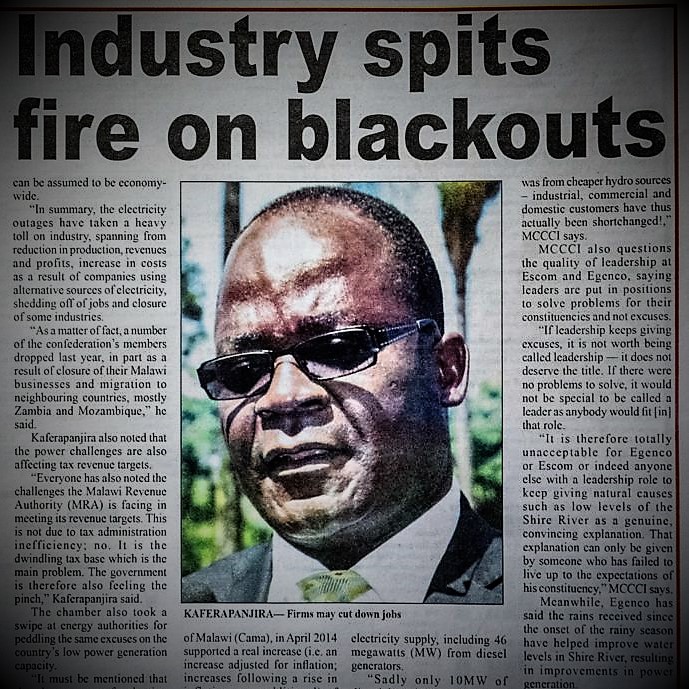
The Malawi Confederation of Chambers of Commerce and Industry (MCCCI) has expressed anger over persistent power outages that rocked the country in 2017, saying their repercussions to the industry reached unprecedented levels.
According to MCCCI’s Impact of Electricity on Businesses Survey, whose results were released on Wednesday, businesses, especially those in manufacturing, spent about K1.2 billion in alternative power, as compared to K470. 6 million which they could have spent on Escom power, just to keep production going.
The chamber says, if not improved in the next six months, the power outages may lead to most companies downsizing, resulting in massive job losses.
The survey reveals that 49 percent of the respondents would shed jobs if the situation persisted in the next six months while 51 percent would not.
MCCCI also says the situation has directly affected Foreign Direct Investment (FDI) inflows to the country.
“Loss of confidence is dangerous — no investor invests his or her money in an environment that is gloomy. This should therefore be a cause for concern for government,” the survey reveals.
Commenting on the results, MCCCI Chief Executive Officer, Chancellor Kaferapanjira, said the power problem has not spared any business.
“All of them are feeling the pinch and, therefore, the impact of the power outages
can be assumed to be economy-wide.
“In summary, the electricity outages have taken a heavy toll on industry, spanning from reduction in production, revenues and profits, increase in costs as a result of companies using alternative sources of electricity, shedding off of jobs and closure of some industries.
“As a matter of fact, a number of the confederation’s members dropped last year, in part as a result of closure of their Malawi businesses and migration to neighbouring countries, mostly Zambia and Mozambique,” he said.
Kaferapanjira also noted that the power challenges are also affecting tax revenue targets.
“Everyone has also noted the challenges the Malawi Revenue Authority (MRA) is facing in meeting its revenue targets. This is not due to tax administration inefficiency; no. It is the dwindling tax base which is the main problem. The government is therefore also feeling the pinch,” Kaferapanjira said.
The chamber also took a swipe at energy authorities for peddling the same excuses on the country’s low power generation capacity.
“It must be mentioned that the phenomenon of reduction in water levels in the Shire River is not new. That is why stakeholders, including MCCCI and the Consumers Association
of Malawi (Cama), in April 2014 supported a real increase (i.e. an increase adjusted for inflation; increases following a rise in inflation were additional) of 37.26 percent to be implemented over a four-year period to enable Escom to finance new projects that would diversify sources of electricity supply, including 46 megawatts (MW) from diesel generators.
“Sadly only 10MW of diesel based generation was implemented. This means consumers have been paying the higher price of diesel generated electricity although the electricity was from cheaper hydro sources – industrial, commercial and domestic customers have thus actually been shortchanged!,” MCCCI says.
MCCCI also questions the quality of leadership at Escom and Egenco, saying leaders are put in positions to solve problems for their constituencies and not excuses.
“If leadership keeps giving excuses, it is not worth being called leadership — it does not deserve the title. If there were no problems to solve, it would not be special to be called a leader as anybody would fit [in] that role.
“It is therefore totally unacceptable for Egenco or Escom or indeed anyone else with a leadership role to keep giving natural causes such as low levels of the Shire River as a genuine, convincing explanation. That explanation can only be given by someone who has failed to live up to the expectations of his constituency,” MCCCI says.
Meanwhile, Egenco has said the rains received since the onset of the rainy season have helped improve water levels in Shire River, resulting in improvements in power generation.
Egenco spokesperson, Moses Gwaza, said on Wednesday power generation has improved from 200MW in mid-December to 220MW
